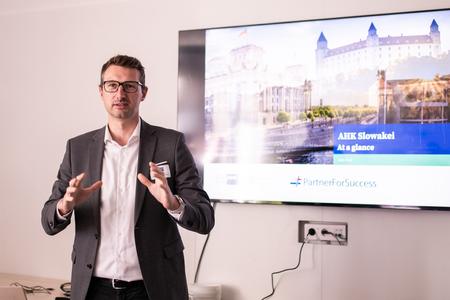“If a company has a successful business in Slovakia, it is natural that they would want to expand abroad,” Patrícia Tóthová, founder and managing partner of the business administration service company ProfiDeCon says.
The company, active in all Visegrad Group countries, helps companies looking to do business abroad by providing a suite of comprehensive services so that they can meet local legal, tax and labour requirements.
In Slovakia it also helps companies employ foreigners.
“We want to hear the story of the client and look at it through the eyes of a lawyer, an economist and an expert in taxes, as we have expertise in all of these fields,” says Tóthová.
How it started
After working for several international corporations in Germany, Tóthová, an attorney by profession, launched the business in 2015. On maternity leave with her first child, she had just moved back to Slovakia.
“Slovak companies planning to do business in Germany were looking for help communicating with local authorities about permissions and registrations,” she tells The Slovak Spectator.
At the start, she worked from her living room, but as her client base grew and her work increased her husband Pavol, who had worked in HR for a number of large US corporations, joined the business.
Today they have a team of 14 people and, as well as ProfiDeCon, they run a law firm, ProfiDeCon Slovakia, providing legal services. They have offices, physical and virtual, in the Czech Republic, Hungary, Poland and Germany, as well as a network of external co-workers and experts in individual countries.
“We provide support to Slovak, Czech, Polish and Hungarian companies who send their employees, or suppliers abroad, while we also help companies relocate their foreign employees to Slovakia,” says Tóthová.
Main clients
Many of its clients are small and medium-sized companies from the construction, electrical engineering, plumbing and heating sectors and assembly businesses who send employees or self-employed contractors abroad.
“These tend to be for types of skilled work in which Germany and Austria lack a large enough workforce [of their own],” says Tóthová.
In these cases, companies expand to Germany but rather than opening a subsidiary there, they send their employees or suppliers abroad to fulfil the contracted orders.
“These companies have to meet a lot of German or Austrian legislative requirements,” explains Tóthová.
These include, among others, registering employees with customs offices, correctly setting up work contracts with employees, and meeting minimum wage requirements.
“Germany is also very specific in that in the case of construction work, it has a so-called withholding tax,” explains Tóthová, adding that this is true for both companies and self-employed contractors.
If a company does not want the German customer to deduct this withholding tax, it has to register with the German tax office and request an exemption from the tax.
“This is actually the most frequent request from our clients, because, of course, everyone wants the invoice to be paid in full,” says Tóthová, adding that communication with German offices have their specific features. For example, the best way to communicate with German tax offices, she insists, is by fax.
As well as other requirements, such as registering for value-added tax and income tax, companies also have to watch how many days their employees or suppliers spend in the given country to avoid having to set up what is known as a permanent establishment there, which would mean they would have to pay salary tax or income tax in a particular jurisdiction.
“We try to give comprehensive information to companies – when they need to do something in the given country, what their obligations are, what they need to do to make sure they are not fined,” says Tóthová.
She warns that companies doing business in Austria must observe strict criteria related to dependent work and that fines for not complying with these rules can in some cases be so high as to spell the end of the business.
She explains that apart from paying remuneration to an employee sent to perform a job in Austria as an Austrian worker, each company has to pay him or her a travel allowance. This can make their potential business in Austria uneconomical.
“Once they find out about the conditions for sending employees to Austria to fulfil an order, more than half of our clients change their mind and give it up,” she says. She points out though that many requirements for firms in Germany are less strict because of labour shortages in certain professions.
Trying abroad
ProfiDeCon helps companies expand their business abroad, too.
“Slovakia, with a population of 5.5 million, is a relatively small market, so it makes sense that successful companies would want to try their luck abroad,” says Tóth.
Some companies launch branches in Germany for marketing or visibility reasons, noted Tóth, adding that having a label on a product saying the distributor is from Germany can have a positive impact on sales. Construction companies launch branch offices in Germany to increase their chances of winning public tenders.
But Tóth warns that what works in Slovakia will not necessarily work in Germany, because of local specifics. Moreover, the tax burden and costs of running a company in Germany are higher than in Slovakia.
“Some companies go to Germany under the impression that Germany is a large market and they are sure they will succeed there,” he says. “If they do not calculate it properly, their expansion may not have the desired effect and they could end up turning to us to help them sell or liquidate their branch.”
However, he says the firm has seen many success stories.
“They start with one order for a German client, who, satisfied with their performance, mediates orders for them in other countries,” says Tóth.
Shortage of German speakers
The reason why companies seek assistance when communicating with offices in German-speaking countries is the language barrier, as there is a shortage of German speakers in Slovakia.
Tóthová says her firm has encountered problems finding German-speaking people to work for them.
One of the biggest problems is finding someone who can communicate in formal German – when talking to a German partner or investor, or dealing with German authorities, a knowledge of colloquial language is not enough, she points out.
She notes that English is more widely spoken than German in Slovakia, and that there are relatively few schools specialising in German, such as bilingual grammar schools.
“It’s a shame because the language is used [officially] in three countries – Germany, Switzerland and Austria – and the latter is our neighbour,” says Tóthová.
Her company helps German firms establish subsidiaries in Slovakia, and she says that those companies are interested in finding partners and employees who speak German, as English is not a widely spoken language among Germans.
“They find it easier to communicate in German,” says Tóthová.
Slovakia needs foreign labour, but…
The experience of Tóthová and her husband in helping companies employ foreigners in Slovakia has led them to believe that Slovakia is failing to tap the potential for foreign workers to help fill long-term gaps in the local labour market.
“The mindset in Slovakia is that we don’t like foreigners regardless of the fact that our economy can’t function without foreign workers,” says Tóth, adding that this is reflected in the attitudes of many people working at embassies, consulates and the Foreigners’ Police. “There is no will among the people in charge to change this mindset.”
He gives an example of the kind of problems involved when employing foreigners in Slovakia.
“There isn’t a problem in rules for employment of foreigners in Slovakia being strict, but that the Foreigners’ Police offices as well as police employees themselves are not unified in the rules and requirements,” says Tóth.
Tóthová adds that shortage of personnel at the Foreigners’ Police as well as at Slovak embassies can often result in potential employees, and the companies that want them, waiting months just to get an appointment at the Foreigners’ Police.
On average, it takes six to nine months for a company to bring an employee from a non-EU country who needs a visa in order to enter the country into Slovakia and get them working.
“Companies often say, well, I can’t wait so long for this particular person, so let’s go and set up a branch in Hungary or Poland,” says Tóthová, adding that those states have much more flexible systems when it comes to employing foreigners.
“Shortening this process would make Slovakia more attractive for foreign investors,” she says.



